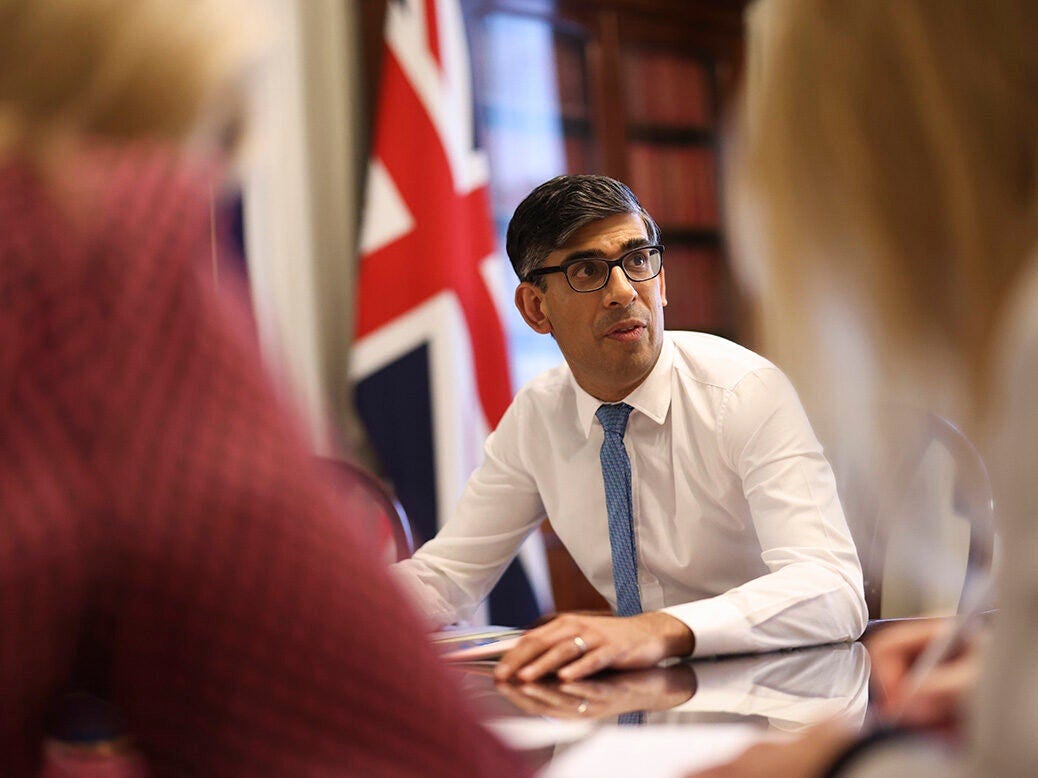Good morning. The walls are closing in around Humza Yousaf. The BBC is reporting this morning that the SNP First Minister could resign as early as today to pre-empt the two confidence votes later this week. Since he succeeded Nicola Sturgeon, Yousaf has struggled to reset the narrative, waylaid by debates over trans rights and free speech. His authority has been shot (as our Scotland editor Chris Deerin wrote in this prescient piece last week). He has tried to court both the Greens – who he removed from government – and Alba’s sole MSP Ash Regan to vote for him in the confidence votes. But he has failed.
A politician who is bad at politics overwhelmed by what his predecessors left behind: sound familiar? We’ll be watching what happens at Holyrood closely on the New Statesman website.
But today: a few thoughts on how a brewing diplomatic row with Ireland could help Rishi Sunak. Then, Rachel has gone behind the Tory party scenes to discover whether Sunak can survive Thursday’s local elections. And Ben examines Scottish polls.
Get it all by signing up here!
Five months ago, an anti-migrant riot set Dublin ablaze. The scenes punctured the perception among some UK politicians that Ireland was this cosy, progressive paradise in the face of insurgent nationalism around Europe.
That is the context for the rising prominence of immigration in Irish politics. This week the new taoiseach – the young, affable, career politician Simon Harris – called for Ireland’s cabinet to look at ways to send migrants back to the UK after his government said the Rwanda scheme meant more asylum seekers were heading to Ireland. The Irish justice minister Helen McEntee said last week that more than 80 per cent of those applying for asylum in Ireland were thought to have crossed over the border with Northern Ireland.
Rishi Sunak has said this is a sign that the Rwanda scheme does act as a deterrent to migrants – the key question when it comes to the scheme’s workability. The UK government will reportedly not accept any returns from Ireland until France, and the EU at large, agrees to a comprehensive returns agreement. The Irish government isn’t happy. McEntee was supposed to meet the Home Secretary James Cleverly today to discuss the matter, but the Irish tánaiste, Micheál Martin, will now meet the Northern Ireland Secretary Chris Heaton-Harris instead.
There are two conclusions to be drawn here. First, the Irish government has essentially proved that the principal behind the Rwanda scheme is sound. In other words, the scheme does have a deterrent effect. This is good for Sunak, not least in the run-up to Thursday’s local elections. Deterrence is the way government ministers bypass tricky questions about the policy’s cost and Rwanda’s capacity to house migrants. Second, the news gives the British the upper hand in negotiations with the EU over returns to France, or at least allows the UK government to highlight a discrepancy between two member states. Another bonus for Sunak.
This is a relatively low-level diplomatic disagreement for now. But it has the potential to become a totemic debate that could help the government in its as-yet-unsuccessful attempt to sell its flagship policy.
Freddie’s picks
Salman Rushdie speaks to Erica Wagner about how he managed to write about the attack on his life and what went through his mind in those 27 seconds.
Rory Scothorne is always worth reading. Here he dissects the collapse of the Bute House Agreement.
“Every football club is a Ship of Theseus.” Brilliant book review from Barney about how data changed football forever.
This is terrific, poignant reporting from Will Lloyd on the horrific conditions that migrants in northern France endure (Sunday Times).
Will Rishi Sunak survive the local elections?
Cast your mind back to 6 May 2021. The UK was still slowly creeping out of lockdown, with socialising indoors in most settings still banned. The Covid vaccine roll-out was under way, with around half the population having received their first jab. And Boris Johnson was enjoying a bounce in the polls as Keir Starmer struggled to cement his authority (in a critical essay for the New Statesman, Tony Blair warned that Labour was “asking whether Keir is the right leader”).
It feels like a different era – one that, perhaps, many of us have tried to forget. But that was the context in which the suite of local council seats up for grabs this Thursday (2 May) was last fought. Which should give you some idea of how the Tories are feeling as we head towards the last major polling event before the general election.
“In May 2021, the Conservatives were 8 to 10 points ahead of Labour,” Joe Twyman, the founder of Deltapoll, told me. “Since then, their vote has essentially halved.”
Click through to the NS to read the rest, or MC subscribers can read in full in-email.
Keep reading with a 7-day free trial
Subscribe to Morning Call to keep reading this post and get 7 days of free access to the full post archives.








